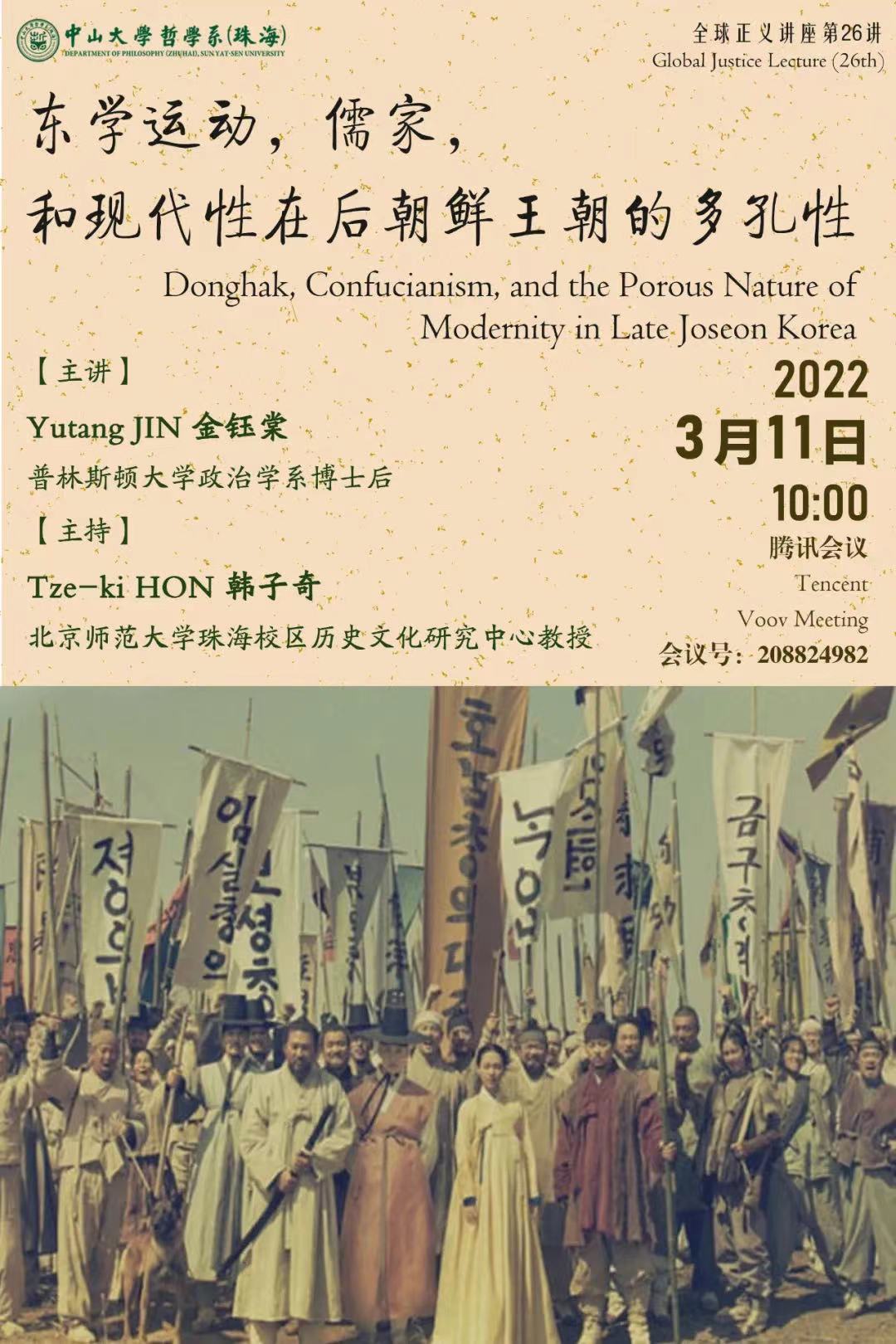中山大学哲学系(珠海)举办线上讲座"全球正义讲座"第二十六讲
来源:中山大学哲学系(珠海)作者: 2022-03-17 17:33

03月11日 10:00,中山大学哲学系(珠海)举办线上讲座《全球正义讲座第二十六讲:东学运动,儒家,和现代性在后朝鲜王朝的多孔性》。
Global Justice Lecture (26th)
Organizer
Department of Philosophy (Zhuhai),Sun Yat-sen University
Topic
Donghak, Confucianism, and the Porous Nature of Modernity in Late Joseon Korea (Virtual)
Speaker
Yutang JIN,
Postdoctoral Research Associate,
Politics, Princeton University
Moderator
Tze-ki HON
Professor, Research Center for History and Culture, Beijing Normal University
Time
10:00 March. 11. 2022
Tencent (VOOV) ID
208-824-982
Abstract
Recent scholarship in comparative political theory and postcolonial studies has decidedly challenged the parochial assumption about the linear, unidirectional transportation of singular modernity from the West to the non-West. This article joins the inquiry into the dynamism and multiplicity of modernity in the non-West by focusing on the intellectual thought of Eastern Learning (donghak 동학) and explores the extent to which it contributed to the emergence in Korea of what I call “Confucian modernity” that challenges the univocal discourse of Western modernity. Donghak was an intellectual, religious and mass movement that swayed Korea from the mid to late nineteenth century in response to the crisis of the traditional Confucian hierarchy and the existential threat from the West. Against the conventional view that refers to donghak as standing outside, and potentially running afoul of, Confucianism, I first interpret donghak as an endogenous phenomenon expressive of Confucianism’s self-transformation and modernization. Second, I argue that donghak’s respect for humanity as embodied in its core tenet of “humans as Heaven” (innaecheon 인내천) radically displaces and refocuses Confucian teachings on persons (contra the masses), equality, and human dignity. In each of the three aspects, donghak modernized Confucianism in a way that defies a simple divide between faith and reason and without losing sight of elite Confucian as well as folk sentiments of Koreans in the late Joseon dynasty. As such, donghak as well as the mass mobilization and rebellions it spawned have profound implications for the search for modernity in Korea and East Asia today.
全球正义讲座第二十六讲
1
主办
中山大学哲学系(珠海)
2
主题
东学运动,儒家,和现代性在后朝鲜王朝的多孔性(线上)
3
主讲
Yutang JIN(金钰棠)
普林斯顿大学政治学系博士后
4
主持
Tze-ki HON(韩子奇)
北京师范大学历史文化研究中心教授
5
时间
2022年3月11日10:00
6
地点
腾讯会议 208-824-982
摘要
现代性从西方到非西方的输出被认为是单向的、线性的,这一狭隘的对现代性的单一性的假设在近期的比较政治学理论和后殖民研究中受到了根本性的挑战。通过对韩国东学运动中学术思想的关注,本文参与关于现代性在非西方社会中所显现的动态性和多重性的讨论,探讨东学运动在何种程度上促成了一种挑战了西方单一现代性叙事的“儒家现代性”的兴起。东学运动是19世纪中后期,韩国为应对传统儒家等级制度的危机及西方带来的生存威胁而产生的一场全国性的知识分子、宗教和群众的运动。不同于主张东学运动与儒家思想无关且和儒家存在潜在冲突的传统观点,我首先把东学运动解释为一种内生于儒家的、表现了儒家的自我转型和现代化的现象。而后,我主张东学运动的“人即是天”的核心理念所体现的对人性的尊重使韩国儒学发生了根本性的转向,儒学转而关注个人(相对于群体而言)、平等、和人类尊严这三个层面。东学运动在这三个层面使儒家以一种不仅避免了西方的信仰和理性的简单二分法,且没有忽视儒家精英的视野和伤害韩国民众情绪的方式在朝鲜王朝后期完成了现代化。从这个意义上讲,东学运动以及它所引发的全民性的动员和反抗对当今的韩国和东亚的现代性研究有着深远的意义。
编辑:张懿程
文章、图片版权归原作者所有,如有侵权请联系删除
